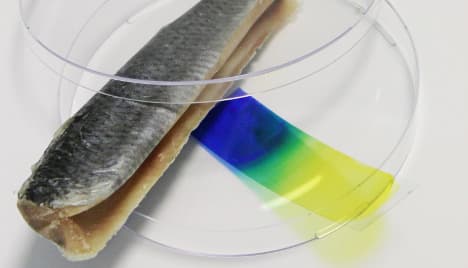Scientists invent packaging able to detect bad food

German scientists have developed a special plastic film that changes colour in contact with rotting food, possibly soon making bad meat or fish from the supermarket a thing of the past.
The researchers at the Fraunhofer Research Institution for Modular Solid State Technologies in Munich have created a “sensor film” that turns from yellow to blue. It can be cheaply added to food packaging so that shoppers can see with their own eyes whether food is still good and avoid potential food poisoning.
“There is no guarantee with ‘best before’ dates that the meat is still fresh – for example if you store it improperly,” researcher Anna Hezinger told The Local on Wednesday. “With this, you really see when the meat is rotten.”
The film, which would add only a few cents to the cost of packaged meat, chicken or fish, works like litmus paper, which is used to detect acidity. A dye in the plastic film reacts chemically with amines – molecules given off as food decays.
“As micro-organisms decay the meat, bio-organic amines are released into the air within the packaging,” Dr Hezinger said. “We developed this (plastic) for meat and fish but almost any fresh food releases these amines.”
The institute has had interest from partners in the food and packaging industries, though Dr Hezinger could not say who they were.
Shoppers may see the new packaging soon, though it would probably take more than a year, she said. Because it is cheap to make, the film could be added to a wide range of packaging.
Fraunhofer scientists have already used the film to make first aid bandages that indicate if a wound is infected, she said.
They are also working on T-shirts that would change colour if an athlete is becoming dehydrated and needs to drink more water. As body fluids drop, sweat becomes more acidic. Plastic polymers in the T-shirt could detect this change before potentially dangerous dehydration sets it.
Comments
See Also
The researchers at the Fraunhofer Research Institution for Modular Solid State Technologies in Munich have created a “sensor film” that turns from yellow to blue. It can be cheaply added to food packaging so that shoppers can see with their own eyes whether food is still good and avoid potential food poisoning.
“There is no guarantee with ‘best before’ dates that the meat is still fresh – for example if you store it improperly,” researcher Anna Hezinger told The Local on Wednesday. “With this, you really see when the meat is rotten.”
The film, which would add only a few cents to the cost of packaged meat, chicken or fish, works like litmus paper, which is used to detect acidity. A dye in the plastic film reacts chemically with amines – molecules given off as food decays.
“As micro-organisms decay the meat, bio-organic amines are released into the air within the packaging,” Dr Hezinger said. “We developed this (plastic) for meat and fish but almost any fresh food releases these amines.”
The institute has had interest from partners in the food and packaging industries, though Dr Hezinger could not say who they were.
Shoppers may see the new packaging soon, though it would probably take more than a year, she said. Because it is cheap to make, the film could be added to a wide range of packaging.
Fraunhofer scientists have already used the film to make first aid bandages that indicate if a wound is infected, she said.
They are also working on T-shirts that would change colour if an athlete is becoming dehydrated and needs to drink more water. As body fluids drop, sweat becomes more acidic. Plastic polymers in the T-shirt could detect this change before potentially dangerous dehydration sets it.
Join the conversation in our comments section below. Share your own views and experience and if you have a question or suggestion for our journalists then email us at [email protected].
Please keep comments civil, constructive and on topic – and make sure to read our terms of use before getting involved.
Please log in here to leave a comment.